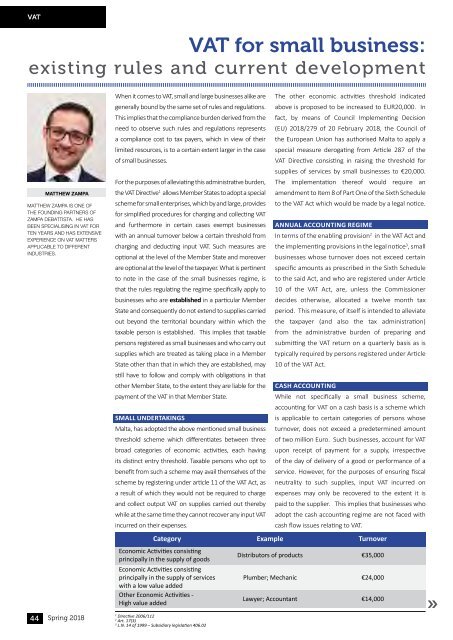ACCSPRING18_ONLINEVER
You also want an ePaper? Increase the reach of your titles
YUMPU automatically turns print PDFs into web optimized ePapers that Google loves.
VAT<br />
VAT for small business:<br />
existing rules and current development<br />
MATTHEW ZAMPA<br />
MATTHEW ZAMPA IS ONE OF<br />
THE FOUNDING PARTNERS OF<br />
ZAMPA DEBATTISTA. HE HAS<br />
BEEN SPECIALISING IN VAT FOR<br />
TEN YEARS AND HAS EXTENSIVE<br />
EXPERIENCE ON VAT MATTERS<br />
APPLICABLE TO DIFFERENT<br />
INDUSTRIES.<br />
44 Spring 2018<br />
When it comes to VAT, small and large businesses alike are<br />
generally bound by the same set of rules and regulations.<br />
This implies that the compliance burden derived from the<br />
need to observe such rules and regulations represents<br />
a compliance cost to tax payers, which in view of their<br />
limited resources, is to a certain extent larger in the case<br />
of small businesses.<br />
For the purposes of alleviating this administrative burden,<br />
the VAT Directive 1 allows Member States to adopt a special<br />
scheme for small enterprises, which by and large, provides<br />
for simplified procedures for charging and collecting VAT<br />
and furthermore in certain cases exempt businesses<br />
with an annual turnover below a certain threshold from<br />
charging and deducting input VAT. Such measures are<br />
optional at the level of the Member State and moreover<br />
are optional at the level of the taxpayer. What is pertinent<br />
to note in the case of the small businesses regime, is<br />
that the rules regulating the regime specifically apply to<br />
businesses who are established in a particular Member<br />
State and consequently do not extend to supplies carried<br />
out beyond the territorial boundary within which the<br />
taxable person is established. This implies that taxable<br />
persons registered as small businesses and who carry out<br />
supplies which are treated as taking place in a Member<br />
State other than that in which they are established, may<br />
still have to follow and comply with obligations in that<br />
other Member State, to the extent they are liable for the<br />
payment of the VAT in that Member State.<br />
SMALL UNDERTAKINGS<br />
Malta, has adopted the above mentioned small business<br />
threshold scheme which differentiates between three<br />
broad categories of economic activities, each having<br />
its distinct entry threshold. Taxable persons who opt to<br />
benefit from such a scheme may avail themselves of the<br />
scheme by registering under article 11 of the VAT Act, as<br />
a result of which they would not be required to charge<br />
and collect output VAT on supplies carried out thereby<br />
while at the same time they cannot recover any input VAT<br />
incurred on their expenses.<br />
Category<br />
Economic Activities consisting<br />
principally in the supply of goods<br />
Economic Activities consisting<br />
principally in the supply of services<br />
with a low value added<br />
Other Economic Activities -<br />
High value added<br />
1<br />
Directive 2006/112<br />
2<br />
Art. 17(3)<br />
3<br />
L.N. 14 of 1999 – Subsidiary legislation 406.02<br />
Example<br />
Distributors of products<br />
Plumber; Mechanic<br />
Lawyer; Accountant<br />
The other economic activities threshold indicated<br />
above is proposed to be increased to EUR20,000. In<br />
fact, by means of Council Implementing Decision<br />
(EU) 2018/279 of 20 February 2018, the Council of<br />
the European Union has authorised Malta to apply a<br />
special measure derogating from Article 287 of the<br />
VAT Directive consisting in raising the threshold for<br />
supplies of services by small businesses to €20,000.<br />
The implementation thereof would require an<br />
amendment to Item 8 of Part One of the Sixth Schedule<br />
to the VAT Act which would be made by a legal notice.<br />
ANNUAL ACCOUNTING REGIME<br />
In terms of the enabling provision 2 in the VAT Act and<br />
the implementing provisions in the legal notice 3 , small<br />
businesses whose turnover does not exceed certain<br />
specific amounts as prescribed in the Sixth Schedule<br />
to the said Act, and who are registered under Article<br />
10 of the VAT Act, are, unless the Commissioner<br />
decides otherwise, allocated a twelve month tax<br />
period. This measure, of itself is intended to alleviate<br />
the taxpayer (and also the tax administration)<br />
from the administrative burden of preparing and<br />
submitting the VAT return on a quarterly basis as is<br />
typically required by persons registered under Article<br />
10 of the VAT Act.<br />
CASH ACCOUNTING<br />
While not specifically a small business scheme,<br />
accounting for VAT on a cash basis is a scheme which<br />
is applicable to certain categories of persons whose<br />
turnover, does not exceed a predetermined amount<br />
of two million Euro. Such businesses, account for VAT<br />
upon receipt of payment for a supply, irrespective<br />
of the day of delivery of a good or performance of a<br />
service. However, for the purposes of ensuring fiscal<br />
neutrality to such supplies, input VAT incurred on<br />
expenses may only be recovered to the extent it is<br />
paid to the supplier. This implies that businesses who<br />
adopt the cash accounting regime are not faced with<br />
cash flow issues relating to VAT.<br />
Turnover<br />
€35,000<br />
€24,000<br />
€14,000

















